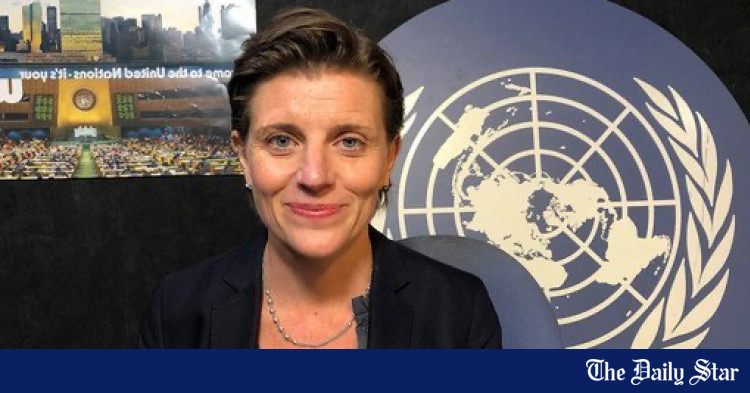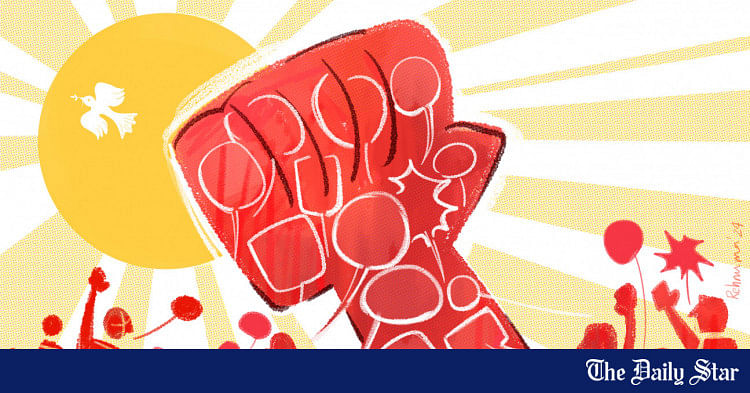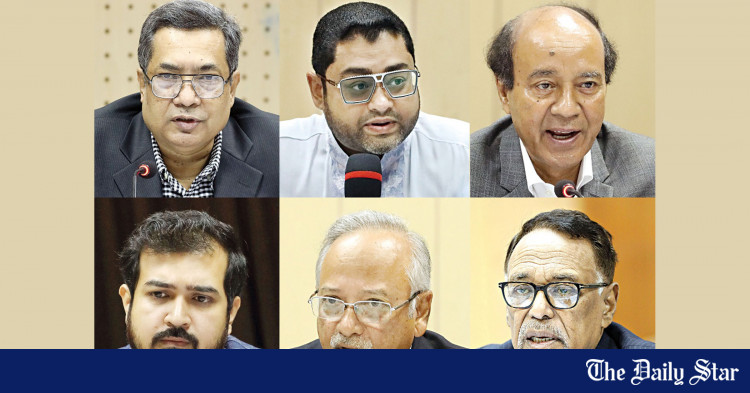Engage private sector more in reforms to energise economy
Business leaders urge govt at The Daily Star discussion
Mir Nasir Hossain
Former president of FBCCI
A tighter monetary policy taken by the Bangladesh Bank alone cannot contain inflation. The government should take steps to curb extortion and establish healthy management in the supply chain to control the rising prices.
Mostafa Kamal
Chairman of MGI
Vietnam takes only 7 days to decide on an investment proposal, but red tape delays the process in Bangladesh to over 7 months. A law should be there to complete the process within 3 months.
Kamran T Rahman
President of MCCI
Allocating just 10 percent of the unused lands of tea gardens can help generate up to 6,000MW of clean energy. This can be delivered to industries hit by the energy crisis through corporate power purchase agreements.
Monzur Hossain
Research director of BIDS
The government should go for thorough analysis of every sector and review the policies once every three months. Besides,
inflation will not come down if reserves do not become stable.
Tanvir Ahmed
MD of Envoy Textiles
The recent labour unrest has heavily damaged the country's image. I know a group, which lost a work order of 20 million pieces of garments to Vietnam just because of the unrest.
Abrar Hossain Sayem
President of BAYLA
Bangladesh can establish a national data platform and go for using big data analytics with the help of artificial intelligence to make informed decision for capacity expansion or investment in any sector.
The government should increase its engagement with the country's private sector in making policies and decisions amid ongoing reforms, according to prominent business leaders, who cited major challenges such as high inflation, rising interest rates and slowing demand and investment that are now plaguing private businesses.
Mentioning that the private sector is the key driver of Bangladesh's economy, they said increased engagement can better resolve their issues and remove investment bottlenecks, boosting employment and economic growth.
The businessmen were speaking at a discussion, styled "100 days of the Interim Government: Economic Review", organised by The Daily Star at its office in Dhaka.
Tanvir Ahmed, managing director of Envoy Textiles, said the local economy has stagnated and businesses have become dry. "The economy must be put in order fast. Otherwise, trouble in the financial sector will continue to rise."
He said people have a lot of expectations from this government, so it should sit with the stakeholders. But they have not seen any such interactions until now.
"We are exposed. We know our sufferings better than anyone else," Ahmed said.
Mir Nasir Hossain, a former president of the Federation of Bangladesh Chambers of Commerce and Industry (FBCCI), said there was virtually no government in Bangladesh for three days between August 5 and August 8 following the ouster of the Sheikh Hasina-led government by a mass uprising.
"Miscreants took this advantage and continued unrest."
Apart from the weak law and order situation, Hossain added that there were also logical reasons for the unrest in the garment sector. He said workers were angry as they were not being given different service benefits.
It was also due to some of the factory owners delaying regular salary payments, he said.
Moreover, instigation from outsiders was also a major cause for the labour unrest in the garment sector, he added.
Children of workers are being deprived of better education, while workers must now spend more for basic housing, he said, adding that the factory owners need to improve community engagement.
"The achievement of this government is good, though it may appear that a lot of expectations remain unfulfilled. But it is not possible to resolve all the issues in such a short time."
He said the energy supply to the production units has improved after liquefied natural gas (LNG) imports by the government. "This must continue."
However, factors including higher bank interest rates have turned into a major cause of concern. "The economy will not grow if investment suffers," he said.
He added that the law-and-order situation must be monitored and an environment of confidence must be created. Besides, political parties have responsibilities in curbing extortion, so they should address this, he said.
"Private sector engagement is necessary. Because only the wearer knows where the shoe pinches."
Mostafa Kamal, chairman and managing director of Meghna Group of Industries (MGI), said the involvement of private sectors stakeholders in decision-making should be increased, he said.
He also said ensuring a consistent energy supply is crucial, saying the government should ensure energy supply through exploration as well as consistent imports.
Kamran T Rahman, president of the Metropolitan Chamber of Commerce and Industry (MCCI), said the banking sector is now in the doldrums.
Citing the high volume of non-performing loans (NPLs) and failed merger attempts for ailing banks, he said, "NPLs have gone through the roof."
He inquired about the progress of the proposed Banking Reforms Commission and urged the interim government to act swiftly. Strengthening money loan courts by increasing the number of judges, he said, could address some immediate issues.
He noted the absence of an exit policy for industries and added many firms cannot leave the business due to a lack of mechanisms.
He also advocated granting duty-free import benefits for raw materials of all export-oriented sectors.
The MCCI president said high inflation has severely affected the population. While interest rate hikes aim to curb inflation, they are straining businesses, he added.
He commended the government for forming reform commissions but urged faster action.
Regarding exports, Rahman urgently stressed the need to meet the European Union's due diligence standards for achieving net-zero carbon emissions by 2030.
Failure, he warned, could devastate the readymade garment (RMG) sector. To support this transition, he proposed allocating 10 percent of land for solar power plants, which could generate 5,000-6,000 MW of clean energy.
This would not only reduce reliance on foreign exchange for energy imports but also bolster export-oriented industries with sustainable power solutions.
Abrar Hossain Sayem, president of Bangladesh Apparel Youth Leaders Association (BAYLA), said sacrifice by the youth played an important role in the formation of the incumbent government and Bangladesh should utilise the bright image of Chief Adviser Professor Muhammad Yunus.
For instance, many international clothing retailers and brands are coming back to Bangladesh with apparel work orders as they have confidence in the Yunus-led government.
He said some 0.4 percent of the local garment factories cannot pay their workers timely because of rises in the cost of doing business. The business cost spike includes a more than 200 percent rise in utility bills, which has been affecting the company's bulk expenditure and profitability.
He said the condition of small and medium ventures should be investigated because of abnormal spikes in the cost of doing business.
Monzur Hossain, research director of the Bangladesh Institute of Development Studies (BIDS), said managing spiralling inflation and implementing sound financial reforms are major challenges for the economy now.
He advocated continuation of the liquidity support to weak banks for their survival.
Hossain said there are private sector representations in two taskforces -- one for developing strategies to boost the economy and mobilise resources for equitable and sustainable development, and another for preparing a "white paper" on Bangladesh's economy.
Envoy Textiles' Managing Director Ahmed said efforts to stabilise the foreign currency reserves and reopen educational institutions after the uprising are some of the major achievements of the current government.
However, expecting a long-term solution from the current government will not be right as it's just an interim government, he said.
"The incumbent government should focus more on the restoration of the law and order and the restoration of confidence in the police force so they can continue. Because new recruitment and replacement of old police is not possible in a short time."
He cited a small incident of shifting a work order for 20 million pieces of garments from Bangladesh to other countries because of the labour unrest.
Ahmed also said the monthly salary of garment factories in the country is more than $600 million and annually the amount is more than $8 billion. The domestic economy is still largely dependent on the garment industry.
He feared losses of $14 billion to $18 billion in the export business of Bangladesh because of the erosion of preferential trade benefits after graduating from the least developed country club in 2026. Local exporters will have to face a 12 percent duty on export to the European Union, where Bangladesh exports more than $25 billion worth of goods in a year.
Bangladesh is still producing low-end garment items with low prices, selling items for $2.80-$2.90 per piece, whereas Pakistan and other countries' average value of garment items ranges between $4.50 per piece and the local exporters make only seven percent profit, he said.
With a higher bank interest rate at 17 percent, sales of apartments also declined to 8,000 units from 20,000 in Dhaka every year, he added.
At the discussion, Mahfuz Anam, editor and publisher of The Daily Star, said, "As a newspaper, we are committed to the growth and prosperity of Bangladesh.
"I believe the private sector is a major actor in that prosperity," he said, adding that The Daily Star wants to be a partner to entrepreneurs who are doing business with integrity and have invested in the advancement of the country.
"We want to be a part of the future growth of Bangladesh. I believe Bangladesh will advance with a healthy, well-governed private sector," he added.








